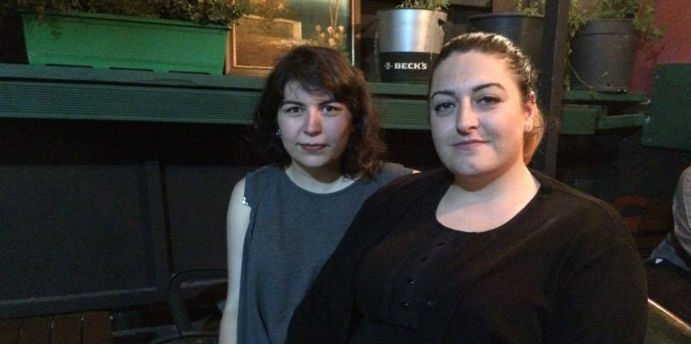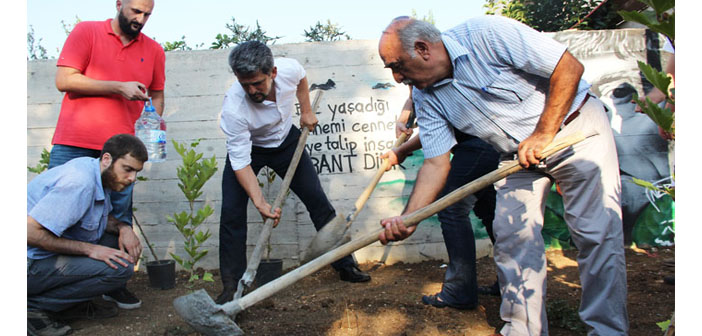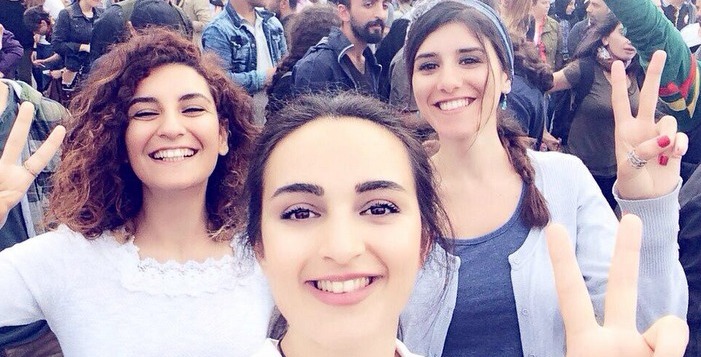Surviving the Suruç massacre, Gökçe Çetin and Merve Kanak told about the past 2 years, legal process and their expectation of justice.
2nd anniversary of the Suruç Massacre, which killed 33 people and wounded many, is getting close. The first hearing of the case, which makes no progress for about 2 years, was held in Urfa on May 4. Two of the suspects, İlhami Ballı and Deniz Büyükçelebi, are still at large and the third suspect Yakub Şahin hadn't even attended the hearing. The hearing was started with the testimonies of the families of the victims and institutions and persons who demand to be an intervening party. The next hearing will be held on July 14.
While the legal process continues perfunctorily, survivors demand justice for their lost friends. Suruç Families and Survivors Initiative stages 33-minute sit-in protest in Kadıköy every month in the memory of 33 victims.
Surviving the Suruç massacre, Gökçe Çetin and Merve Kanak told about the past 2 years, legal process and their expectation of justice.
A confidentiality order was imposed on the file until the first hearing that was held 21 months later than the massacre. The indictment was issued after 18 months. How did you feel in this process?
Gökçe Çetin: We staged sit-in protests for 21 months. Every month, we demanded justice without sinking into despair. We still believe that the justice will come. Our lawyers tried so hard.
Belongings of our friends who were killed in the massacre weren't given to their families on the ground that they are evidence. These demands will be evaluated in the next hearing. We thought that an indictment must have already been issued, but it wasn't. There are some documents from the intelligence agency related to Ankara massacre. There is hardly anything else. All of our petitions are rejected in the hearing. They launched a lawsuit only against provincial police chief Mehmet Yapalıal; they did it because of public pressure. However, they sentenced him to pay 7,500 lira; it was like a reward. We think that this sentence means that state accepts that there are many perpetrators, but they tried to cover it by pinning the crime on a single person.
Merve Kanak: That day, I was inside of Amara Cultural Center. When I was out of there, I said that now we have a Madımak story. Madımak was a case that was dropped due to prescription. I don't think that the justice will be manifested through the state, since you have to feel the pain of those people before providing justice. Given that we are the unwanted citizens for them, I know that justice won't come for us. I think that Suruç was a planned attack. Our bus wasn't searched, but we know that other buses were. How come a person who has been sought for months passed by police station freely? In a small place like Suruç, our criminal records were checked. How come an ISIS member skipped this control? It is important where the state situates itself. Our real supporters will be our friends, NGOs and human rights defenders. There are more of us now; the state didn't expect this. We will always demand justice. We think that Suruç might be a precedent case. Ankara, Taksim and Reina massacres are rooted in the same policy. If we cannot maintain our demand of justice, Suruç will be forgotten. On behalf of my 33 friends, it is my duty to keep reminding it.
“They should know what they have caused”
Gökçe, you were at the hearing that was held on May 4. Can you talk about what happened there?
G.Ç.: Some locals of Urfa hosted us. The hearing was held in prison complex, which is far away from the city center. We were told that it was going to start at 9 am, but they kept us waiting until 3 pm. We were around 300 people and waited in the open for hours. They told that they will take us in order. Though the courtroom was large enough, some people weren't let in. The soldiers in front of the door were equipped with batons and tear gas capsules as if they were going to war. There were many gendarmerie personnel in the room. They tried to criminalize the event. Our phones and bags weren't taken in. They wanted to prevent us from disclosing details of the hearing with the public. This indicates that this is not a normal case for them. Families and complainants were heard. Families were forced to defend their children, mothers, spouses and siblings. This was too hard. We don't have to prove anything, we are the victims. The hearing continued until 11 pm.
None of the suspects was there, right?
G.Ç.: Felon's dock was empty. Our lawyers stated that suspect Yakub Şahin should be brought and others should be caught. The next hearing was going to coincide with Ankara massacre hearing, but we managed to have it changed. The suspect will attend the next hearing through video call. We are in terrible pain, we have to see him and he has to see us. They should know what they have caused.
Except from families, are there other intervening parties?
G.Ç.: The demands of SDGF, ESP, CHP, DBP, TTB, Bar Associations of Istanbul, Antep, Diyarbakir and Urfa and others were rejected. District governor and other state institutions were informed about our trip. We applied for crossing the border legally. The state doesn't take responsibility and the court excludes many institutions dealing with the case; this means that they want to keep the case hanging in the midair.
M.K.: We wanted to build a bridge. That bridge was destroyed and a war began. Suruç made us know for sure that we are not acceptable citizens of this state. We received messages saying that we deserved this. Had we succeeded in making people feel that pain and empathy, other attacks wouldn't have happened. Suruç is presented as a political case. They made a distinction of “us” and “them”. They even said that we exploded ourselves.
“Like an open wound”
Apart from such messages in social media, were you subjected to any abuse in your personal dealings or professional life?
M.K.: I feel like my family, though they are social democrats, doesn't want to talk about Suruç. They questioned how I did something like this and why I was there. However, I worked in tent cities of Suruç 3 times before. This was something that I had to do, but I cannot explain this to my family. I expected my family to support me, but they didn't do it. I understand them, they might be afraid, but their attitude hurts me. They make you feel like you did something bad, as if going to Suruç was a mistake.
When I find out people thinking like this, I give this example: we would have gone to Van after the earthquake or to Gaza, if there were such organizations. What is the difference between this case and Mavi Marmara case? We went there with humane feelings. I cannot understand how people can blame us for something that happened to us. Doesn't the perpetrator have any responsibility?
I published a post on Facebook on the evening of the massacre. My cousin in Netherlands saw it. When he was in Turkey, he told me not to do something like this again. He might have asked how I feel instead of saying such a thing. Though I wasn't wounded, I was out of my mind for about a month after the massacre. I couldn't have passed by doner shops because it smells like burnt flesh. Lack of support of my relatives hurt me a lot. We still cannot talk about Suruç. It is still like a closed book. They ask me when I will stop getting psychological support without asking if I feel well or not. They think that it is something that passed and is forgotten, but it is not. It will stay like an open wound.
G.Ç.: A photo of me was featured in media, so I became a rather familiar face. I know that my family were faced with severe reactions. In the hospital, we were subjected to pressure; I wasn't treated properly. When I was having physiotherapy, I told a worker there, “You ask me how I am wounded, but I don't want to tell it to you, because you wouldn't understand it. I was wounded in Suruç.” A couple of days later, I found out that people in the hospital refer me as terrorist. My physician told me that my treatment will continue, but I was discharged a couple of days later. When I was discharged, that physician wasn't even there. This offended me so much. Before the physiotherapy, I was discharged within a month, though my wounds weren't healed yet. My bones weren't united properly yet. Nobody told me that one of my legs will remain shorter. They claimed that I saw it wrong. They could have simply planted a plate, but they hadn't done it.
I
had to dress my own wounds and inject myself. It was a psychological
burden. I am an ordinary person, I don't have to put up with it.
Still, there are good people. Now, I am working in a school and
people there treat me very well. I took a leave for attending the
hearing. My colleagues are very understanding.
“That 3 centimeters is the void of the victims”
Gökçe, how is your treatment going now?
G.K.: Human Rights Foundation of Turkey has been always with us. Now, we are getting psychological support and they also support our physiotherapy from time to time. In public hospitals, some doctors underestimated my leg that is 3 centimeters shorter. That 3 centimeters is the void of the victims for me and I want to get rid of it. Doctors in public hospitals think that shortness over 4 centimeters would affect one's life negatively. And you can guess how much private hospitals want. Why do I have to pay for my treatment? I don't know if our pain will ever be relieved, but we need more to be physically well.
Most of us are in our twenties. Some things are hard beyond imagination. It is impossible to forget, I remember the pain in every step. You cannot run, you miss buses. You can take crowded vehicles, because people push you. Most of the time, I am afraid that I will be hurt. There were hundreds of wounded, the state should have taken care of us.
Is there anything else you wish to say?
G.Ç.: There was a documentary about Suruç; Merve says something there. We were trying not to step on the grass in front of Amara Cultural Center, because it was hard to grow grass there. We fed the ducks in the pool. We were so careful about each other and environment. Merve said that they even killed those ducks. This is how precious all living beings were for us. However, they destroyed everything that belonged to us and that affected us.





